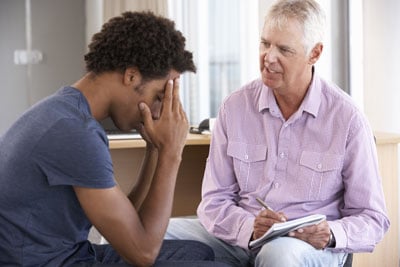Valium is an extremely addictive medication. As a result, many doctors do not like to prescribe it. If they do there is generally a two 2-4 week period during which it is meant to be taken. This is because after that period the development of addiction becomes more and more likely. When developed, Valium was meant to help:
- Anxiety
- Seizures
- Panic attacks
- Nausea
- Alcohol withdrawal
- Muscle relaxation
- Chronic pain
Unfortunately, however, this substance has the potential to become addictive. This is why it is important to have access to treatment services like ours here at Free by the Sea. If you or someone you know misuses Valium, let us help. We know how hard it can be to live with a substance use disorder. We are here for you when you decide that you are ready to start your road to recovery.
Valium: Uses and Purposes
When it was first developed Valium, a benzodiazepine a class of drugs also known as benzos were meant to replace the even more dangerous and addictive class of drugs called barbiturates. These barbiturates, such as Nembutal, are even more dangerous. Valium becomes even more dangerous when mixed with alcohol or opioids, such as fentanyl.
Some of the effects of opioids and benzodiazepines are similar. Both inhibit cognitive functions such as decision making and use of language. Over 30% of opioid overdoses involve benzodiazepine as well as opioids.
One of the uses of valium is helping someone detox from alcohol. It is not recommended that you attempt to detox on your own from alcohol using valium. The use of valium as a way to help someone detoxify from alcohol is meant for trained professionals to use. Medicine, especially the treatment of addiction, is a complicated process that takes years of experience and training to learn.
Valium Reacts with Many Other Substances
There are also many herbs and substances marketed as all-natural that will react negatively to valium. A few of the most common supplements or substances that negatively react to valium are:
- Alcohol
- Gingko
- St. John’s Wort
Some of the medications that react negatively with valium are:
- Oxycodone
- Trazadone
- Orlistat
- Tramadol
- Primidone
- Codeine
Medical Conditions and Valium Use
Letting your doctor know about all of your medical conditions is also vitally important. A few of the medical conditions that your doctor should know about are:
- Liver disease
- Kidney disease
- Myasthenia gravis
- Any breathing problems
- Seizures or a history of seizures
- Glaucoma (narrow-angle or other)
- Alcohol addiction whether an active addiction or if you are on your road to recovery
- Mental health problems such as depression whether your symptoms are managed or not
It is very important to let your medical professionals know if you use tobacco, drink alcohol, or use marijuana no matter your age.
Valium and Pregnancy
If you are pregnant or plan on becoming pregnant it is important in any situation concerning medications, but it is especially important if you and your doctor are considering valium. Valium is a class D pregnancy drug. This means that there is positive proof that it is a risk to the fetus. However, there are situations in which a class D drug might be prescribed. If the fetus is exposed to valium there is the chance that it can be born with:
- Deformities
- Eating problems
- Breathing problems
- Low body temperature
- The baby might experience withdrawal
It is important to get your doctor to help you make the final decision on breastfeeding. An important thing to consider is that valium can pass through the mother’s breast milk into the baby.
You Should Never Try to Detox from Valium on Your Own
It is important to go through a medically licensed detoxification program when you decide to start on your road to recovery and stop taking valium. Detox from valium can be deadly if not done properly. However, there is no case in which detoxification from drugs or alcohol is recommended in a home or other non-clinical setting. Some of the side effects of suddenly not taking valium, or withdrawal, are:
- Tremors
- Insomnia
- Headaches
- Hand tremors
- Grand mal seizures
- Nausea or vomiting
- Feeling of unreality
Besides being much safer, detoxing in a medical setting, the trained staff and medical professionals can make the experience much more comfortable.
Signs of Drug Abuse and Addiction
There are several indicators that someone might have an addiction disorder. It is important to recognize these signs so that you can encourage them to get help as soon as possible. Substance abuse disorder is an extremely serious medical condition. It is not a sign of weakness, selfishness, or any other personality traits. It is a health disorder like cancer and asthma.
It is easy for many people, including the person with the disorder, to go into denial. However, every dose the person takes has the possibility of resulting in an overdose. Many pills are sold over the internet, by drug dealers, and gangs such as cartels. Sometimes those pills have impurities or are laced with other harmful substances.
In some cases, this happens on purpose or by accident from lack of cleaning while ‘chopping’ or mixing different batches of drugs to get them ready for sale. There is also the possibility that the person or company selling the pills is giving out something else labeled as valium. Fentanyl is often in counterfeit pills because it is very cheap to make. It is also extremely powerful so an overdose is more likely. Your loved one also might take too much of a substance looking for a stronger high.
Behavior patterns that may occur with drug abuse or addiction might include the following:
- Lying and secrecy
- Stealing money and valuables can be easily sold
- Unpredictable finances (They might have large sums of money one day and none the next.)
- New friends who might seem suspicious
- Frequent leaving without saying where they are going; seeming to be in a hurry
- Pipes that look strange, a spoon they seem very attached to, small weight scales, and other drug paraphernalia
- Drugs such as pills, powders, or liquids that they hide and which are unfamiliar
Mental Health and Substance Abuse

When someone has a substance abuse disorder as well as another medical disorder, this is known as co-occurring disorders (also known as a dual diagnosis). However, a co-occurring disorder can be any of several other disorders such as asthma that occur in the same person as an addiction disorder. The term dual diagnosis is when the person specifically has another mental health disorder as well as an addiction disorder.
Some individuals who suffer from Valium addiction may also struggle with the effects of mental health disorders. In some cases, addiction actually causes mental health challenges to occur or intensify. In other instances, the opposite is true; mental health disorders lead to the development of drug addiction.
Get Help for Valium Addiction Today!
If you do find your loved one with drugs or find out they are taking addictive substances in any other way it is important to be ready for denial. One of the excuses your loved one might make is that it’s ok because valium is a prescription drug. Whether it comes from a pharmacy or a dealer it still has the possibility of causing an overdose. Sometimes an intervention is necessary.
Denial is not only found in the person with the substance abuse disorder. Sometimes family, friends, and other people close to the person who is experiencing an active substance abuse disorder will go into denial as well. It is very hard to accept that your loved one is going through this struggle. You may even think that you are to blame, even if only partially.
But, please know that there is hope for those who suffer from addiction. Help is available through professional addiction treatment. Allow Free by the Sea to provide hope and guidance to you and your family at this time. We can help to end valium addiction in your life or in the life of your loved one.
Addiction is a destructive disorder. It can tear apart families and delay lives. When you are ready to start your road to recovery, we at Free by the Sea are here to help. At our state-of-the-art facility, we concentrate on helping you holistically heal and start your new life of sobriety. Contact us when you are ready to start to heal.

Dr. Richard Crabbe joined our team in 2019 as our psychiatrist and medical director. He attended the University of Ghana Medical School where he became a Medical Doctor in 1977. From 1978 through 1984, he was a medical officer in the Ghana Navy and provided a variety of services from general medicine to surgeries. He received his Certificate in General Psychology from the American Board of Psychology and Neurology in 2002.



